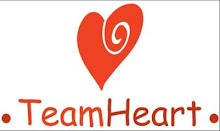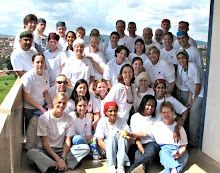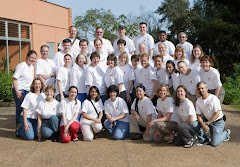.JPG)
In picture, from left to right: Kayla Quin, Jean Habiyamana, John Connell, Jean Damascene, Denise Ricci and Terry Roche
A shy, young man with a large liver and shortness of breath presented through the Butare Medical Center to Partners In Health, the Boston based NGO in April of 2008. Jean, a striking, tall young man, almost gaunt, whom appeared to feel comfortable, spoke in limited English, though he is fluent in both French and Kinyarwandan. Said to be “in school,” his dark, bright eyes quickly assessed everyone in the room anxiously. He watched carefully as our nurse educator taught a younger student and listened intently as she read the pre-operative teaching booklet with the group having surgery. His fear was not of the pain that he might have having cardiac surgery. His fear was he might not be selected to endure that pain.
His parents and siblings were all killed in the genocide in 1994. He had been living in an orphanage since age 3—a very lucky young man. Not only had he had a roof over his head, but he had food as often as they could supply it and was sent to the local school. At sometime in his childhood he most likely had a strep infection, maybe a sore throat. Untreated, he developed rheumatic fever and it progressed to rheumatic heart disease. It wasn’t that anyone ignored his raw throat and fever. But it occurred at a time when medical care in Rwanda was in shambles as they recovered from the effects of the genocide in which less than 400 physicians and 3500 nurses were left to tend to 9 million people.
He was sick, maybe too sick, to do in Rwanda. Discussions about patient selections weighed in on both sides. In his favor, was he was very bright and said to be a good student. He would be able to participate and manage his own care….which would include long-term anticoagulation therapy. If selected, he would be able to return to school, complete it, and be a candidate for college education. Perhaps a teacher to educate others or to work in a business to support himself and a potential family.
With a great deal of relief, he did well through surgery, very well. Convalescence was compromised by the expected post operative heart failure that would take time to improve and time for the liver to return to normal. In retrospect, it is amazing how well he did…..on the day we left, as the other patients lined up outside for photos to be taken, he was missing. Found to be in his bed he was huddled under the covers, sheet over head and sobbing. For two weeks, he had had a staff full of Brigham and Women’s Hospital nurses addressing his ever need—more attention he had had in a life-time. He had completed post operative teaching about the future care and follow-up and what was expected. Much teasing was done about this group of handsome young men and their future. He was not so sure there was a future…still in an orphanage until they pushed him out; no one had time for him to be the center of their universe, as most of us do for our children.
I had reports periodically that he was doing well. He was managing his Coumadin, although he had not shown up for appointments because he had no money for transportation. Money raised to support this aspect was tied up in paper work. His liver was said to be shrinking, his mitral regurgitation decreasing …
On a recent trip to return to Rwanda, I saw a tall, very handsome, still almost gaunt, young man walking down the hall with a smile to light up the universe. One year later, he was doing well and was surviving in a way we find hard to imagine here. For the moment he has a bed to sleep in and sometimes food. He says the governmental support for genocide survivors is delayed so he has been out of school. A quick Western Union transfer got him back in school and food for the month. Discussion ensued about eating as healthy as possible, at least one meal a day, and continuing follow-up care. We talked of plans to send an allowance and forget the paperwork that appeared to be perpetually tied up. As I felt a stab of concern …was he telling me the truth? I felt some faith in the world was a good thing. I asked him about college….he was speechless. He asked if he could call me Mummy.
This young man is an integral part of Rwanda’s future and ought to deserve a chance at success, not merely survival, for himself and his country as much as anyone else. When his college education is completed, he will become a valuable part of country’s future economic growth. An allowance now can provide him access to important benefits that most take for granted, such as healthy food and instructions on how to prepare, mentoring to teach a healthy life style, how to manage a small allowance, lessons that can teach him how to make the most of what he’s been given……and perhaps the knowledge that people really care about what happens to him.
He is one of the patients we have been given the opportunity to work with. You can help.




No comments:
Post a Comment